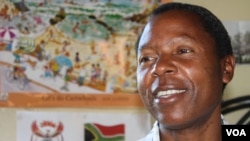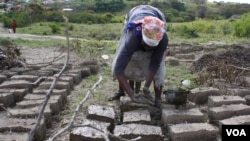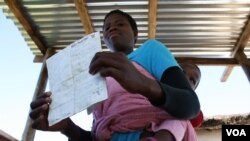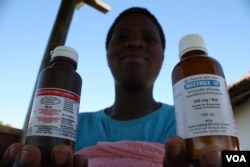BULUNGULA, SOUTH AFRICA —
This is Part Three of a five-part series Continue to Parts: 1 / 2 / 3 / 4 / 5
Inside a hut that echoed with emptiness at Masizini, a village in the interior of South Africa’s Wild Coast region, a woman in a pink uniform, its shoulders adorned with purple padding into which silver and blue medals were pinned, folded her ample arms, sighed and laughed.
“There’s no electricity here…There are no chairs, no bed for examinations, no screens for privacy,” said Esther Zonke. She pointed to the floor, “There’s the mud…It’s dusty, very dusty, to those who have got asthma.”
Then, she laughed again. But it was a dry, sarcastic cackle that seemed to contain no pleasure. Its bitterness made her sound like someone who had conceded defeat a very long time ago and was now merely enduring the lot that life had flung her way.
Every Tuesday the nurse employed at a distant government-run hospital visits the isolated village, in Bulungula district in Eastern Cape province, to provide healthcare services to people who otherwise would not have access to any. Every Tuesday, seated on a plastic chair at a small wooden desk, patient files spilling from a cardboard box, Zonke administers HIV tests, examines people stricken with tuberculosis and gives concerned mothers antibiotics for their sick infants.
Medicines are dispensed out of cooler boxes from the back of a pick-up truck parked on the wilted grass outside the hut.
The patients stand uncomfortably in front of Zonke to be pricked and prodded; babies are often placed on the ground in front of her for scrutiny.
“This shelter is not convenient because there’s no privacy here, and no facilities. We are just improvising by using it, but it’s better than us having nothing at all. At least we still have medicines to give to people,” said Zonke.
Child deaths
A long queue awaiting the nurse’s attention meandered haphazardly away from the hut’s entrance. Black flies buzzed and settled in the corners of cracked mouths. People coughed hoarsely; some moaned in fever. Babies wailed. Some patients remained silent in their sickness.
Some were here to fetch their monthly supply of antiretroviral [ARV] medication to prevent them from dying of AIDS; others wanted nothing more complicated than a vitamin tonic to bolster immune systems weakened by malnourishment.
Not very far away from the mud structure, the sun burned gold into the hair and skin of international tourists, who frolicked in the turquoise sea and on the ivory colored beaches, and paddled leisurely up placid lagoons in canoes.
But the magnificent face of paradise did not stop to gaze on the people of Bulungula; it ignored them and they, in turn, seemed blind to its beauty. Only suffering recognized them.
“The child mortality rate here is alarmingly high,” said Rejane Woodroffe, director of the local Bulungula Incubator [BI] NGO. She explained that more than half of all households in the area had lost an infant less than a year old to diarrhea.
“A third of households have lost two children, at least two. Then there was one household that lost nine children…And one household that lost eight,” said Woodroffe. “The reasons for their deaths are usually very simple – lack of clean drinking water and lack of sanitation facilities…”
And the fact that when people here get sick, they don’t have the means to travel to far away hospitals and clinics for treatment.
Government failure
“Anybody here who has a difficult labor, or has a stroke…pregnant women having epileptic fits; those people should be able to get emergency healthcare. But they can’t here, so people die in ways that should be completely preventable,” said Woodroffe. “You have zero option. There is no ambulance that will come, at all. There’s no number you can phone; you’re just basically stuffed.”
In the mountainous terrain, with its roads of sharp rocks, dirt and mud, four wheel drive taxis charge 800 rand [almost US$ 90] for a one-way trip to the closest government hospital. That’s money the local residents, most of whom survive on meager state anti-poverty grants, just do not have.
Despite “years of promises,” the government had so far failed to provide the Bulungula district with an ambulance, said the BI’s health manager, Nomzingisi Hopisi. “The government is failing us. They are failing to give us what is important,” she commented.
“It’s nothing less than a human rights abuse,” said Woodroffe.
Residents speak disparagingly of the provincial government’s past pledges to build a number of clinics in the region.
“In 2003 I heard about that but it never happened. We are still waiting,” said Hopisi.
Community takes action
Last year the BI secured a tiny piece of land from a Xhosa chief at Masizini. It offered it to the government as a site for a clinic, hoping that this would spur the state on to build a clinic.
According to Peter Nyawhiri, who was in charge of the project for the BI, provincial government representatives again promised to build the “health point” and to supply it with drugs, medical equipment and nurses – as long as the community itself made the mud bricks required for the building.
Nyawhiri announced the good news to the people of the Masizini area, who he said were “beyond overjoyed.” A group of elderly women had soon completed the bricks required for construction.
However, a month later, one of the government officials contacted the BI manager with a “shocking” announcement: the provincial health department had only enough money in its budget to build a fence around the health point.
Having promised the community a facility where it would finally be able to get basic healthcare, the NGO scrambled to find funding for it elsewhere. The BI, together with Masizini residents, then built the structure, and installed toilets and a water tank.
It now even pays the salaries of the community health workers attached to the health point – something the government had also undertaken, but failed, to do.
“The government gives us a nurse once a week and also gives the health point simple medicines. Of course, we are grateful for that,” said Hopisi.
Nyawhiri said the BI in the end had “no choice” but to step in to do the work that many consider to be the government’s responsibility. “People are dying here,” he said.
“Ultimately we just want to help people. We want to give them a place to go and get their treatment without having to spend half a day to get there,” said Sam Partington, an American medical student volunteer at the BI.
The relevant Eastern Cape government department in the town of Elliotdale did not respond to repeated requests for comment with regard to the Masizini health point.
However, South Africa’s Special Investigating Unit – tasked with probing graft in official circles – has found that the provincial health department is riddled with corruption. It says in the past three years health officials have stolen tens of millions of dollars from Eastern Cape health funds – totaling more than a billion rand.
In some cases, the government employees established fake companies and paid themselves for services that were never rendered, and also channeled millions of rand to the businesses of family members.
‘We just prayed…’
Under the clinic’s blindingly luminescent silver tin roof that blistered and warped in the sun, Nontsatsa Nosele fingered a tattered government health card bearing the title, ‘Road to Health Chart.’ The slight woman, looking much younger than her 24 years, was queuing to see nurse Zonke.
Nosele’s two year old son, Okuhle, stared wide eyed and silently from his position strapped to her back with a blanket. “I’ve come for my child’s health. He is sick…He is not eating and is vomiting, for two weeks now,” she told VOA.
It took Nosele and her baby two hours to walk here from their home. Before the health point was established, Nosele would have to pay 30 rand [US$ 3.30] for a taxi trip to the closest clinic – a journey of more than an hour by road.
But, the unemployed mother more often than not did not have that money and so she and her relatives went without healthcare. “We just prayed that we would not get seriously ill,” said Nosele. “We just survived.”
Following her consultation with Zonke, she maintained that the health point, even though it provided only the most rudimentary of healthcare services, had improved her life dramatically.
Nosele smiled as she held two bottles that Zonke had given her. “The nurse said I must just give my baby one teaspoon of this multivitamin syrup every day. Then this other medicine – the nurse said I must boil water and mix it and give it to the child three times a day. I’m happy now that my child is going to start eating food again. Maybe that will make him much better,” she said.
Zonke said the building of the health point had saved many lives in the Bulungula district by radically boosting HIV-infected people’s access to ARVs. Previously, they’d have to fetch supplies of the life-prolonging pills from Madwaleni Hospital.
“To get there from here it takes about two hours by car, so you can imagine how long it took people to walk there, especially when they were ill or weak from the HIV,” the nurse stated.
The great distance and physical effort involved in collecting medication at Madwaleni often resulted in people infected with HIV defaulting on their treatment. Eventually they developed full-blown Aids, and died.
No money
Back inside the hut void of a stretcher on which she could examine patients “sort of decently,” Zonke dreamed of the day she would manage a “proper” clinic in Masizini village.
“I spoke to the health department about it again the other day,” she said, laughing. “It said there’s no money.”
But for many community healthcare workers in Bulungula district, the absence of money has never been a legitimate excuse for a provincial government that through the years has consistently failed to spend large parts of its health budget, and has been accused of consistent corruption.
“For us it’s quite interesting to hear news reports saying an ambulance took three hours to arrive to fetch an ill patient, because here they just won’t come at all,” said Rejane Woodroffe, who in her former life was a senior economist at a leading financial multinational.
“All you need to solve that problem is to get some four by four ambulances. People have a right to that. It’s not a luxury. There’s really no excuse, and it’s a quick win. It’s an easy thing for the health department or government to do in a country as wealthy as South Africa is…Giving just two ambulances to the two local hospitals would make a massive difference to child mortality rates and to quality of life in this area.”
But, as Woodroffe would later acknowledge, in a part of South Africa that seems to have been forgotten by the authorities since democracy descended on the country in 1994, nothing’s easy … Except for the tourists baking to brown on the beach under the sun that never seems to stop shining.
This is Part Three of a five-part series Continue to Parts: 1 / 2 / 3 / 4 / 5
Inside a hut that echoed with emptiness at Masizini, a village in the interior of South Africa’s Wild Coast region, a woman in a pink uniform, its shoulders adorned with purple padding into which silver and blue medals were pinned, folded her ample arms, sighed and laughed.
“There’s no electricity here…There are no chairs, no bed for examinations, no screens for privacy,” said Esther Zonke. She pointed to the floor, “There’s the mud…It’s dusty, very dusty, to those who have got asthma.”
Then, she laughed again. But it was a dry, sarcastic cackle that seemed to contain no pleasure. Its bitterness made her sound like someone who had conceded defeat a very long time ago and was now merely enduring the lot that life had flung her way.
Every Tuesday the nurse employed at a distant government-run hospital visits the isolated village, in Bulungula district in Eastern Cape province, to provide healthcare services to people who otherwise would not have access to any. Every Tuesday, seated on a plastic chair at a small wooden desk, patient files spilling from a cardboard box, Zonke administers HIV tests, examines people stricken with tuberculosis and gives concerned mothers antibiotics for their sick infants.
Medicines are dispensed out of cooler boxes from the back of a pick-up truck parked on the wilted grass outside the hut.
The patients stand uncomfortably in front of Zonke to be pricked and prodded; babies are often placed on the ground in front of her for scrutiny.
“This shelter is not convenient because there’s no privacy here, and no facilities. We are just improvising by using it, but it’s better than us having nothing at all. At least we still have medicines to give to people,” said Zonke.
Child deaths
A long queue awaiting the nurse’s attention meandered haphazardly away from the hut’s entrance. Black flies buzzed and settled in the corners of cracked mouths. People coughed hoarsely; some moaned in fever. Babies wailed. Some patients remained silent in their sickness.
Some were here to fetch their monthly supply of antiretroviral [ARV] medication to prevent them from dying of AIDS; others wanted nothing more complicated than a vitamin tonic to bolster immune systems weakened by malnourishment.
Not very far away from the mud structure, the sun burned gold into the hair and skin of international tourists, who frolicked in the turquoise sea and on the ivory colored beaches, and paddled leisurely up placid lagoons in canoes.
But the magnificent face of paradise did not stop to gaze on the people of Bulungula; it ignored them and they, in turn, seemed blind to its beauty. Only suffering recognized them.
“The child mortality rate here is alarmingly high,” said Rejane Woodroffe, director of the local Bulungula Incubator [BI] NGO. She explained that more than half of all households in the area had lost an infant less than a year old to diarrhea.
“A third of households have lost two children, at least two. Then there was one household that lost nine children…And one household that lost eight,” said Woodroffe. “The reasons for their deaths are usually very simple – lack of clean drinking water and lack of sanitation facilities…”
And the fact that when people here get sick, they don’t have the means to travel to far away hospitals and clinics for treatment.
Government failure
“Anybody here who has a difficult labor, or has a stroke…pregnant women having epileptic fits; those people should be able to get emergency healthcare. But they can’t here, so people die in ways that should be completely preventable,” said Woodroffe. “You have zero option. There is no ambulance that will come, at all. There’s no number you can phone; you’re just basically stuffed.”
In the mountainous terrain, with its roads of sharp rocks, dirt and mud, four wheel drive taxis charge 800 rand [almost US$ 90] for a one-way trip to the closest government hospital. That’s money the local residents, most of whom survive on meager state anti-poverty grants, just do not have.
Despite “years of promises,” the government had so far failed to provide the Bulungula district with an ambulance, said the BI’s health manager, Nomzingisi Hopisi. “The government is failing us. They are failing to give us what is important,” she commented.
“It’s nothing less than a human rights abuse,” said Woodroffe.
Residents speak disparagingly of the provincial government’s past pledges to build a number of clinics in the region.
“In 2003 I heard about that but it never happened. We are still waiting,” said Hopisi.
Community takes action
Last year the BI secured a tiny piece of land from a Xhosa chief at Masizini. It offered it to the government as a site for a clinic, hoping that this would spur the state on to build a clinic.
According to Peter Nyawhiri, who was in charge of the project for the BI, provincial government representatives again promised to build the “health point” and to supply it with drugs, medical equipment and nurses – as long as the community itself made the mud bricks required for the building.
Nyawhiri announced the good news to the people of the Masizini area, who he said were “beyond overjoyed.” A group of elderly women had soon completed the bricks required for construction.
However, a month later, one of the government officials contacted the BI manager with a “shocking” announcement: the provincial health department had only enough money in its budget to build a fence around the health point.
Having promised the community a facility where it would finally be able to get basic healthcare, the NGO scrambled to find funding for it elsewhere. The BI, together with Masizini residents, then built the structure, and installed toilets and a water tank.
It now even pays the salaries of the community health workers attached to the health point – something the government had also undertaken, but failed, to do.
“The government gives us a nurse once a week and also gives the health point simple medicines. Of course, we are grateful for that,” said Hopisi.
Nyawhiri said the BI in the end had “no choice” but to step in to do the work that many consider to be the government’s responsibility. “People are dying here,” he said.
“Ultimately we just want to help people. We want to give them a place to go and get their treatment without having to spend half a day to get there,” said Sam Partington, an American medical student volunteer at the BI.
The relevant Eastern Cape government department in the town of Elliotdale did not respond to repeated requests for comment with regard to the Masizini health point.
However, South Africa’s Special Investigating Unit – tasked with probing graft in official circles – has found that the provincial health department is riddled with corruption. It says in the past three years health officials have stolen tens of millions of dollars from Eastern Cape health funds – totaling more than a billion rand.
In some cases, the government employees established fake companies and paid themselves for services that were never rendered, and also channeled millions of rand to the businesses of family members.
‘We just prayed…’
Under the clinic’s blindingly luminescent silver tin roof that blistered and warped in the sun, Nontsatsa Nosele fingered a tattered government health card bearing the title, ‘Road to Health Chart.’ The slight woman, looking much younger than her 24 years, was queuing to see nurse Zonke.
Nosele’s two year old son, Okuhle, stared wide eyed and silently from his position strapped to her back with a blanket. “I’ve come for my child’s health. He is sick…He is not eating and is vomiting, for two weeks now,” she told VOA.
It took Nosele and her baby two hours to walk here from their home. Before the health point was established, Nosele would have to pay 30 rand [US$ 3.30] for a taxi trip to the closest clinic – a journey of more than an hour by road.
But, the unemployed mother more often than not did not have that money and so she and her relatives went without healthcare. “We just prayed that we would not get seriously ill,” said Nosele. “We just survived.”
Following her consultation with Zonke, she maintained that the health point, even though it provided only the most rudimentary of healthcare services, had improved her life dramatically.
Nosele smiled as she held two bottles that Zonke had given her. “The nurse said I must just give my baby one teaspoon of this multivitamin syrup every day. Then this other medicine – the nurse said I must boil water and mix it and give it to the child three times a day. I’m happy now that my child is going to start eating food again. Maybe that will make him much better,” she said.
Zonke said the building of the health point had saved many lives in the Bulungula district by radically boosting HIV-infected people’s access to ARVs. Previously, they’d have to fetch supplies of the life-prolonging pills from Madwaleni Hospital.
“To get there from here it takes about two hours by car, so you can imagine how long it took people to walk there, especially when they were ill or weak from the HIV,” the nurse stated.
The great distance and physical effort involved in collecting medication at Madwaleni often resulted in people infected with HIV defaulting on their treatment. Eventually they developed full-blown Aids, and died.
No money
Back inside the hut void of a stretcher on which she could examine patients “sort of decently,” Zonke dreamed of the day she would manage a “proper” clinic in Masizini village.
“I spoke to the health department about it again the other day,” she said, laughing. “It said there’s no money.”
But for many community healthcare workers in Bulungula district, the absence of money has never been a legitimate excuse for a provincial government that through the years has consistently failed to spend large parts of its health budget, and has been accused of consistent corruption.
“For us it’s quite interesting to hear news reports saying an ambulance took three hours to arrive to fetch an ill patient, because here they just won’t come at all,” said Rejane Woodroffe, who in her former life was a senior economist at a leading financial multinational.
“All you need to solve that problem is to get some four by four ambulances. People have a right to that. It’s not a luxury. There’s really no excuse, and it’s a quick win. It’s an easy thing for the health department or government to do in a country as wealthy as South Africa is…Giving just two ambulances to the two local hospitals would make a massive difference to child mortality rates and to quality of life in this area.”
But, as Woodroffe would later acknowledge, in a part of South Africa that seems to have been forgotten by the authorities since democracy descended on the country in 1994, nothing’s easy … Except for the tourists baking to brown on the beach under the sun that never seems to stop shining.




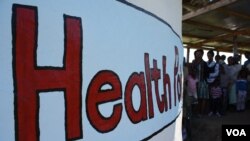
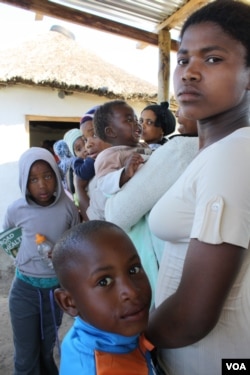
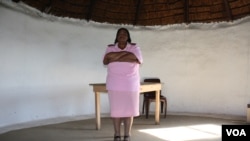
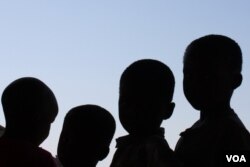
![Rejane Woodroffe, director of the Bulungula Incubator [BI] NGO (D. Taylor/VOA)](https://gdb.voanews.com/66EAF482-665B-4532-8B25-22F9C7A39C8D_w250_r1_s.jpg)

